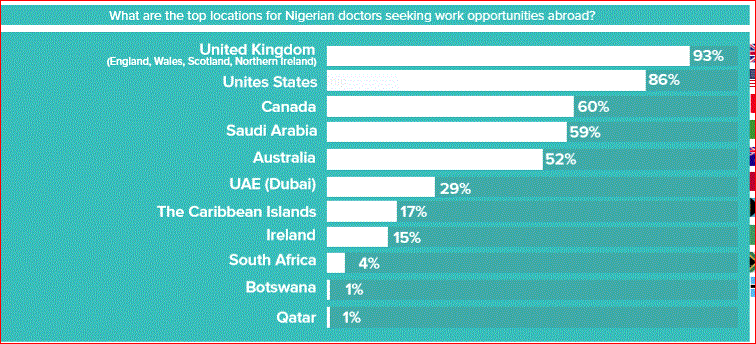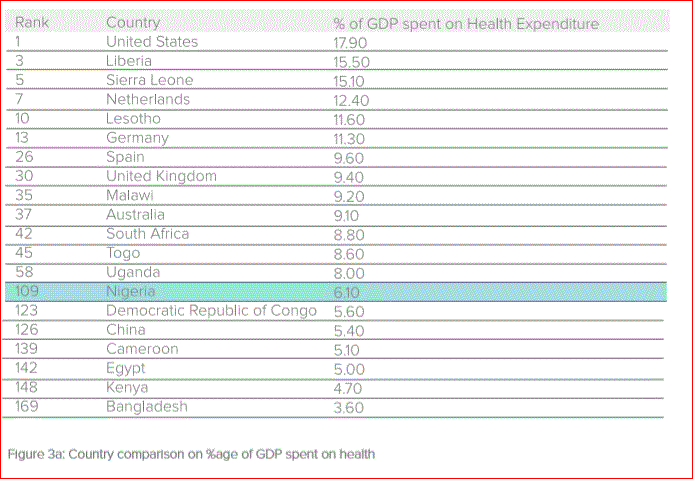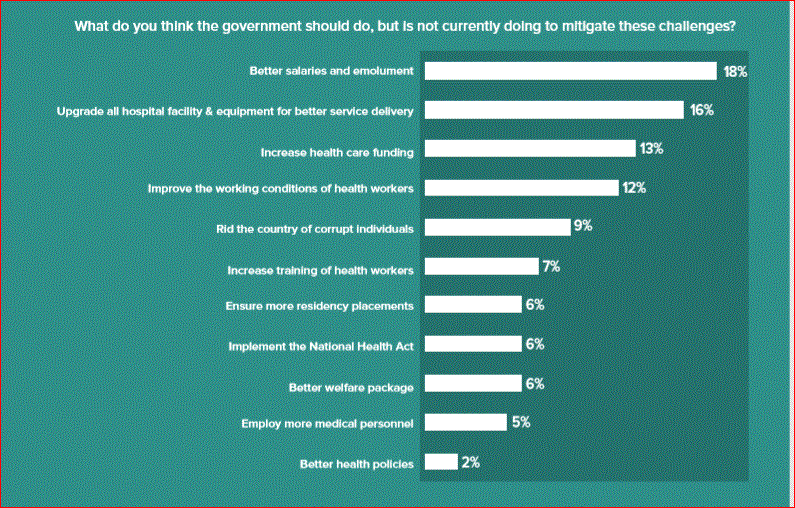Here are countries to where Nigerian doctors flee, and why

By Theophilus Abbah
Though emigration of doctors from Nigeria to developed countries is not a new phenomenon, a recent survey has revealed that the current rate of emigration by doctors which intensified in that last three years may be injurious to the country’s health sector.
The survey conducted NOI Poll and Nigeria Health Watch showed that out of 72,000 medical doctors registered with the Medical and Dental Council of Nigeria, only approximately 35,000 are practising in the country. This is in spite of the fact that an estimated 3,000 doctors graduate from the medical schools of Nigerian universities annually.
The respondents in the survey were medical personnel who practice in Nigeria and abroad. The researchers discovered that 93 per cent of the respondents said medical personnel who flee this country go to the United Kingdom, where the ratio of doctors to population beats of WHO recommended ratio of one medical doctor to 600 persons. Also, 86 per cent of the respondents say United States is another target country for medical doctors who emigrate from Nigeria in search of greener pastures abroad. Others are Canada (60%), Saudi Arabia (59%), Australia (52%), UAE (29%), Caribbean Island (17), Ireland (15%), South Africa (4%), Botswana (1%), and Qatar (1%).

To show the prevalence of emigration, all respondents in the survey knew medical personnel who have moved to other countries to practice. Again, almost nine of 10 respondents, put at about 88%, disclosed in the survey that they were seeking work opportunities in other parts of the world. One of the shocking data published in the survey shows the medical board of Trinidad and Tobago populated by Nigerian names in the majority. This is the extent to which Nigerian medical personnel are desperate to quit the country.
The report said, “Some consultants who have been in the labour force longer than junior doctors quipped that the trend of doctors moving out of the country for work opportunities wasn’t this way, and unfortunately it seems to have risen in the last few years. One went further to add that when the salaries of doctors were reviewed upwards some years ago, the rate of doctors emigrating out of the country declined. Unfortunately, it seems to have increased again with the poor working conditions and environment, lack of work opportunities, and the poor salary which is not commensurate with the rising cost of living.”
The Minister of Labour, Dr Chris Ngige, claimed recently that there is a positive perspective to the emigration, as medical doctors who practice abroad were among Diaspora Nigerians who boost the country’s foreign exchange earnings by their remittances back home.

He was quoted in several newspapers as saying, “They [medical doctors] are surplus in [our] country. We have a surplus in the medical profession in our country. I can tell you this. It is my area, we have excess. We have enough, more than enough, quote me. There is nothing wrong, they go out to sharpen their skills, earn money and send them back home here. Yes, we have foreign exchange earnings from them, not from oil. Those guys go there, they are better trained because of the facilities they have there. Eventually, I know a couple of them who practice abroad but set up medical centres back home. They have CAT scan, MRI scan which even the government hospitals cannot maintain. So, I don’t see any loss. Brain drain will only be inimical when, for instance, neurosurgeons travel and we don’t have neurosurgeons here.”
This intervention by the minister elicited negative reactions. But the survey proved that many medical doctors are emigrating, not necessarily because of the financial rewards abroad but because practicing abroad would give them access to better facilities and work environment. It would also guarantee them higher remuneration, career progression, professional advancement, and better quality of life.
The majority of the respondents claimed that government was unconcerned about mitigating the challenges facing medical doctors in Nigeria. Perhaps, the data that proves the lackadaisical attitude of government to the health sector is a table that shows the percentage of countries’ Gross Domestic Product (GDP) spent on health. On the table the United States ranks as Number One, as 17.90 per cent of its GDP is spent on health. It is followed by Liberia, with 15.50% GDP on health, and then Sierra Leone comes as Number 5 with 15.10 per cent of GDP on health. But Nigeria ranks as Number 109, with 6.10 per cent of its GDP spent on health.

In spite of this low ranking, there are reports that show that Nigeria’s health sector does not expend its allocations in the annual budgets. Every year, the Ministry of Health returns a huge sum of money to the treasury because it could not spend the vote on capital projects. That is why it may be difficult for the ministry to manage the huge sums that would accrue to the sector based on the Federal Governments approval of 1% of Consolidated Revenue Fund (CRF) for health sector.
Apart from poor funding, the working condition of medical doctors is appalling. The research listed the following as the challenges they face: high taxes and deductions from salary; low work satisfaction; poor salaries and emoluments; huge knowledge gap; poor quality of practice; poor relationship among colleagues [some junior doctors complained of being scolded and humiliated by senior doctors]; inadequate opportunities for career progression; poor working environment; lack of proper infrastructure; poor treatment by government; insecurity, and other factors.

The survey was not all about lamentations. It proffered some solutions to the problem. They include the following:
1. Government should enhance access to health under the National Health Insurance Scheme (NHIS). The scheme was instituted in order to meet the globally prescribed Universal Health Coverage, but less that 1 per cent of Nigerians has access to the scheme. The survey recommended that, “Universal Health Coverage would provide the needed health finance necessary to provide a conducive working environment for doctors. Better financing translates to more remuneration, increased training opportunities for doctors, availability of equipment and other consumables.”
2. Government should not focus on tertiary health facilities alone. It was discovered that both federal and state governments spend capital votes on such facilities to the detriment of general hospitals (secondary health facilities) and primary health care clinics. The report recommended that “focusing on [primary and secondary health facilities] would also create more job opportunities for medical doctors around the country.
3. To deal with the lack of job opportunities, which have compelled trained doctors to take up appointments in private hospitals and earn pittance, government should activate its plan to establish a central placement for house officers. It says, “This placement has not taken off yet. Government should commence this placement quickly and ensure that commonly underserved locations are given priority. It would be helpful if this placement is extended to residency and consultancy positions.”
4. It called for a stronger public-private partnerships “to drive increased investment in the healthcare industry, and possibly better remuneration for doctors (which is also a major factor causing them to seek opportunities abroad).” The researchers called for “increased incentives, tax holidays, etc to be given to private investors to encourage investment and growth in the healthcare sector in Nigeria.”
5. Senior doctors should not humiliate junior or young doctors. The report said, “Constantly shouting down junior doctors is demoralising, affects quality of care and, as shown by this research, contributes to doctors emigrating to saner climes.”
The 45-page report is a deliberate attempt to find a solution to a problem that threatens Nigeria’s health sector.
The Insight Report
Nigeria Coverage




Adaji Daniel says:
I’m quite bothered that I this relocation of doctors from Nigeria to other countries of the world continues our health sector may eventually crash below the current state. I am however optimistic that things will take a new look and the doctors will have reasons to stay back and practice in the country.